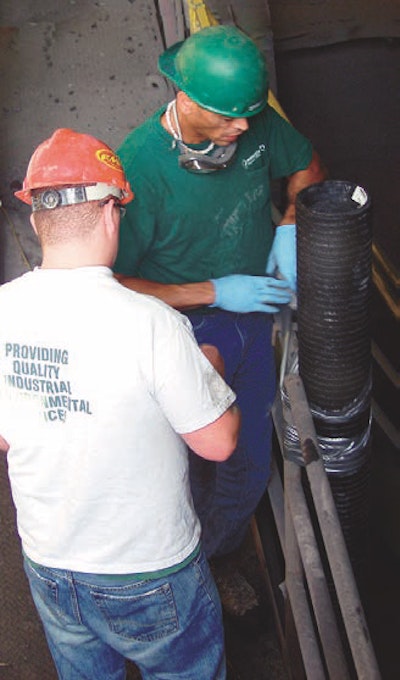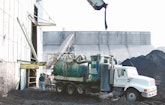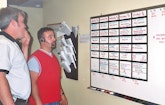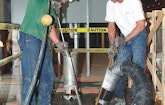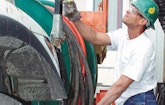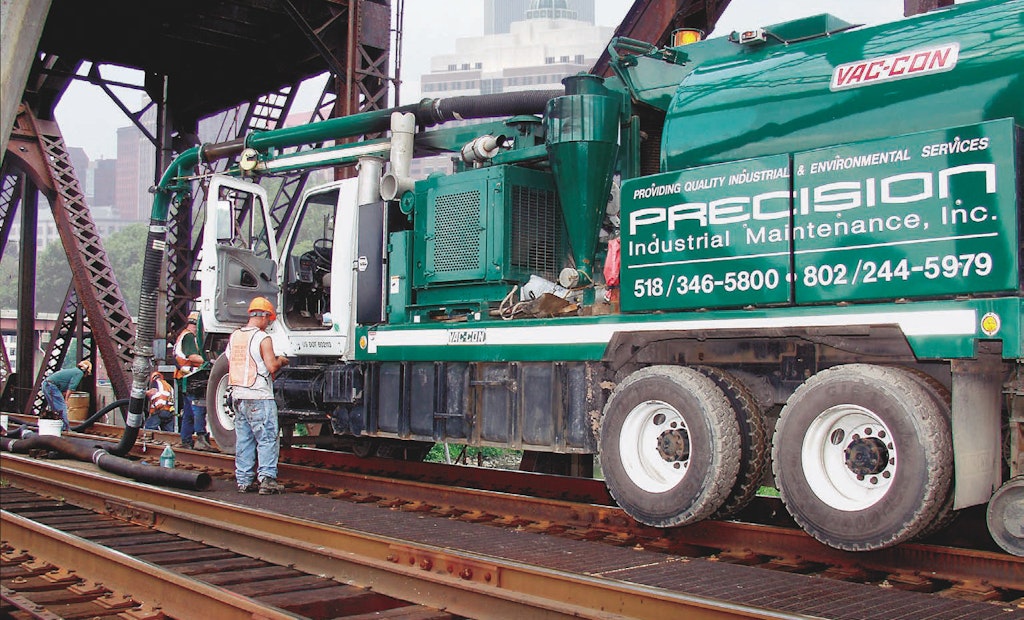
Interested in Industrial?
Get Industrial articles, news and videos right in your inbox! Sign up now.
Industrial + Get AlertsTake a look at this Precision Industrial Maintenance company article featured 10 years ago in the September 2004 issue of Pumper magazine. We spotlight the company again in a follow-up story to see how the business has evolved over the last decade: “Pumper Rewind: Industrial Maintenance Company Hot for UV Liners.”
In the 12 years it took to build from a start-up environmental services company with a single pick-up truck to a business with 22 vehicles, Todd Kilburn learned some important lessons.
Mainly, he learned that it is essential to keep tight control of how that fleet is used. It's essential because the equipment is too expensive to sit idle. It's essential because the vehicles are the basis for growth of the company. And it's essential to provide timely and efficient service to the firm's industrial and commercial customers.
Todd's company, Precision Industrial Maintenance, Inc., operates from Schenectady, N.Y. "Our work is a mix between pumping and cleaning – about 50-50," says Todd. "We have to vacuum out the work areas before we go in and do any cleaning. It's all centered around the vacuum trucks."
As a startup, Todd subcontracted to other entities that had vacuum trucks, until a customer advised him to get his own. After some experience renting vacuum trucks and other equipment, Todd saw the advantages of ownership, and that became his policy.
Getting a grip
"As our fleet inventory grew and our customer base expanded, we hired more crew," says Todd. "We now have 30 employees, six of whom are project managers. We were growing steadily, but our scheduling of equipment was utter confusion, until about three years ago. It was like the old saying, 'beating your head against a wall.' We would get together at the end of each day and try to make up a schedule for the next day. It wasn't working to our advantage."
The projects and scheduling called for some new measures. "The typical value of a job is $6,000 for us," says Todd. "We do 800 of these every year. A job can last for two or three days, or up to two weeks. We needed to find a better way of managing our fleet."
In 2001, he decided to assign one person to equipment and personnel. Today, that's Mike Schoonmaker, who previously worked in the field for Precision and has experience in customer service and inside sales. "Most important, he knew what we did and how we did it," says Todd.
Every Friday, Mike leads a meeting with the project managers, who can request specific equipment and personnel for upcoming work. Sometimes they complete a calendar for a two-week period.
Project manager Craig Corbett comments, "This fleet manager position is vital to us. When we had project managers interacting with customers at any time during the day, our customer needs would change, and equipment availability would also change.
"With Mike in charge of tracking all equipment and personnel, we can set accurate schedules quickly. Previously, when a job opportunity came up, the project managers would have to call each of the other managers before even answering the customer. Sometimes this would take hours or days to get a final answer."
Project managers have the autonomy to coordinate some exchanges of equipment, as long as work is completed satisfactorily and Mike is apprised. Scheduling of personnel is just as important as scheduling the equipment. Crew members' skills and experience differ, and Mike can delegate the work accordingly.
Adding to the fleet
Buying new equipment is a challenge, especially when a new truck can cost up to $250,000. "When we know the market is out there, that is when we will go out and buy," says Todd. "When you have a couple good customers who have projects they want you to do, then you can see the need for an additional vacuum truck or a combination truck."
As the business developed, Todd would rent for five or six months, just to show the customer that Precision could do the job, but in the long run that was too expensive. "I prefer to have my own equipment, but for some contractors renting might be a way to showcase their capabilities. The big things in this industry are service and the ability to respond. If you own equipment that is managed properly and in good condition, you can respond immediately."
In purchasing new vehicles, Todd gets input from the operators. A new truck soon to be delivered is a 2004 International built by Presvac Systems Ltd. with a Roots 3,800 cfm blower, used to vacuum dry materials and sludges. It also has an RCF 1200 Fruitland vane pump suitable for vacuuming flammable materials and has high-dump capability for discharging debris into roll-off containers.
"Before we did the specifications on it, we went to the Pumper & Cleaner Expo in Nashville and took an operator with us," says Todd. "He made suggestions as to what we wanted on the truck. That's the great thing about the fabrication shops. You get exactly what you want if there is room for it on the truck.
"We do a lot of work for the railroad. Two years ago, we purchased a 10-year old refurbished truck equipped with rail gear. "We recently replaced that old truck with a 2003 International Vac-Con combination truck with a stainless steel tank, Roots 4,500 cfm blower, Roots pump, and high-dump capability. Rail gear is expensive, but nobody else in our area does this, and we get the business when the railroad needs work done."
Diverse fleet
Precision uses high-dump units to empty into roll-offs equipped to de-water before disposal of debris and the water. The company does substantial hazardous waste work. Other vacuum trucks include:
- Guzzler unit with Roots 4,500 cfm pump on a 2001 International chassis.
- Presvac unit with Fruitland RCF 1200 vane pump and tank on a 2002 International chassis.
- Presvac roll-off truck with 3,500-gallon tank and Fruitland RCF 1200 vane pump on a 2004 International chassis.
"In our work there are instances when cleaning comes before pumping," says Craig. "We use high-pressure water to break up solids such as mineral buildups, asphalt or cement in a process tank and vessels. We use water blasting equipment with 10,000, 20,000 or 40,000 psi pumps and hand guns. We also use hand tools like scrapers and chipping hammers."
The Vac-Con truck is used to clean pipes and catch basins. "If we can clean from the downhill end of the sewer, we can use our combination unit for both jetting and vacuum," Craig says. "If our only access is from upgrade, then we use a trailer mounted jetter and a separate vacuum truck at the outflow. We have specialty milling nozzles with diamond grinding tips for hardened build up in pipes – mainly cement."
One man, one truck
Although the crew is cross-trained and the company can interchange drivers with trucks, at least 80 percent of the time a driver is dedicated to each truck. "The driver becomes familiar with the truck and how it operates," says Todd. "Any changes in how the truck works are noted. Then the equipment is scheduled for maintenance in a timely manner. If there is a safety issue, it comes out of service immediately."
Regular maintenance – fluid changes and checking of booms, hoses and pumps – is handled in-house, generally outside business hours or on weekends. Major repairs are sent out. "For us right now, it makes more sense for someone else to do that work," says Todd. "For the future, we may consider getting a full time mechanic, or someone who can work on the trucks during off times."
Todd finds that with knowledgeable drivers and regular maintenance, the trucks last a long time, and he seldom makes a replacement. "Even with harsh winters here in our area, if you maintain the equipment, it keeps going," he says. In winter, all vehicles are stored in a heated garage.
Specialized equipment
Todd says the Presvac trucks are like "septic trucks on steroids." The regulations for hauling hazardous waste are stricter than those for hauling septage. Therefore, the trucks are upgraded with higher-volume pumps, dual air valves, roll-over protection, and other features.
"They cost about double the price of a traditional septic service truck," says Todd. "These trucks are frequently called on to suck up heavy-duty oils used for heating in larger institutions. We're doing a job right now where there is piping connected to an oil tank. We might be called on to clean an underground storage tank that holds 3,000 to 4,000 gallons of oil. A couple years ago, we had a job where we had to pump 320,000 gallons of heavy oil." Disposal is not a concern, as licensed facilities are available locally.
While it's a top priority to have the larger vehicles ready to go at any time, Todd is just as concerned about the many smaller tools required in the industry. Maintaining this inventory in the shop is Warren Rifenburgh, who gets requests from the drivers and then coordinates with Mike to be sure everything is on track and ready to go out on the job.
An efficient fleet operated by quality people ensures that Precision Industrial Maintenance is ready to deliver top-flight service and positioned for further growth in the industrial vacuum and cleaning industry.
SIDEBAR: GETTING IT RIGHT
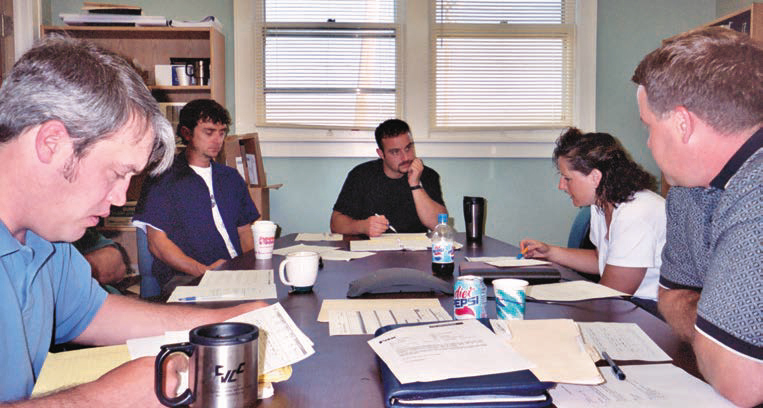
"We're always looking for better ways to manage our fleet and our crew, and we have learned by our mistakes," says Todd Kilburn, owner of Precision Industrial Maintenance, Inc.
"What we like is for everybody to be out and running, and in the busy summer it's hard to keep up. Everything we do centers around the vacuum trucks." Todd gets great input from the managers and credits his crew of drivers.
"They are indispensable," he says. "They do terrific work, and they are never afraid to walk into my office and talk to me. Ninety-nine percent of the time, I'm available." Available is the name of the game in this operation: equipment available, the crew available, the boss with an open door.
